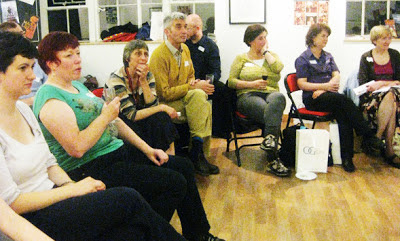The year started with a flurry of Edge books hitting the shelves: Sara Grant's Dark Parties, my own 15 Days Without a Head, plus Someone Else's Life and the first two titles from the Fairy Tale Twist series from Katie Dale. January also saw the first of two guest posts by Caroline Green.
As the year draws to a close, I'm sorry to have to write that our national library service is still in a perilous state. The current government seems either unaware or ambivalent to the vital role libraries play in society and has done little to stop closures and reductions in services across the country. To mark National Libraries Day in February, each of the authors at the Edge wrote a short piece in support of libraries.
March saw the publication of Illegal – the second book in Miriam Halahmy's trio of books set on Hayling Island. Author Mary Hoffman wrote: "Miriam Halahmy has pulled off a difficult trick - a second novel as good as her first."
During events we are often asked for writing tips, so in April the Edge scribes each offered a nugget of wisdom we hoped might be useful to fellow writers young and old.
 |
| Edge authors and the My Voice Libronauts in Warrington |
The Edge Summer Tour kicked off with a trip to meet the My Voice Libronauts in Warrington. This was followed by events in Blackheath, Hounslow and Westminster. The final date saw Dave and Sara performing a double-act of live storytelling at the Edinburgh International Book Festival in August.
We are keen to have a wide variety of voices at the Edge, and were pleased to invite a quartet of book bloggers to give their perspective of teen and young adult fiction. Read what Paula from PaulaSHx, Beth from Page-Turner, Cicely from Cicley Loves Books, and Jeremy from Book Engine had to say.
September saw the publication of Another Life – the eagerly anticipated third book in Keren David's trio of urban thrillers that started with the acclaimed When I was Joe. More good news followed, with the announcement that new Young Adult imprint Strange Chemistry will be publishing Bryony Pearce's The Weight of Souls in the UK and US in August 2013.
We rounded off the year with A Night on the Edge at Foyles bookshop in London, in association with Foyles and the Youth Libraries Group, plus an impressive line-up of award-winning guest authors: Ruth Eastham, Celia Rees and Anne Cassidy.
We are delighted that a number of books by Edge authors have been recognised with award nominations in 2012. These include: SCBWI Crystal Kite (Dark Parties, winner); Cheshire Schools Book Award (Angel's Fury, shortlisted); Leeds Books Award (Angel's Fury, winner 14-16 category and The Truth About Celia Frost, winner 11-14 category); Anobii First Book Award (15 Days Without a Head, Dark Parties, Someone Else's Life, all shortlisted); Sefton Super Reads Award 2012 (The Truth About Celia Frost, winner); Branford Boase (Angel's Fury, nominated); Carnegie Medal 2012 (Hidden and Lia's Guide to Winning the Lottery, both nominated)
Finally, a huge thank you from everyone at the Edge for your support, for visiting the blog and leaving comments. We hope to see you again in 2013.
Happy New Year!
We are keen to have a wide variety of voices at the Edge, and were pleased to invite a quartet of book bloggers to give their perspective of teen and young adult fiction. Read what Paula from PaulaSHx, Beth from Page-Turner, Cicely from Cicley Loves Books, and Jeremy from Book Engine had to say.
September saw the publication of Another Life – the eagerly anticipated third book in Keren David's trio of urban thrillers that started with the acclaimed When I was Joe. More good news followed, with the announcement that new Young Adult imprint Strange Chemistry will be publishing Bryony Pearce's The Weight of Souls in the UK and US in August 2013.
We rounded off the year with A Night on the Edge at Foyles bookshop in London, in association with Foyles and the Youth Libraries Group, plus an impressive line-up of award-winning guest authors: Ruth Eastham, Celia Rees and Anne Cassidy.
 |
| Paula and Bryony at the Leeds Book Awards |
Finally, a huge thank you from everyone at the Edge for your support, for visiting the blog and leaving comments. We hope to see you again in 2013.
Happy New Year!













































